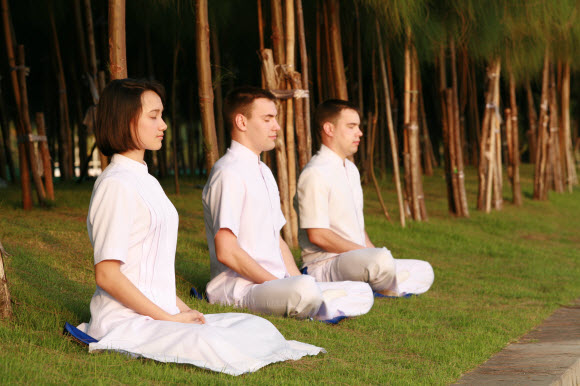Blessing Five:
Having done good deeds in one’s past
Having done good deeds in one’s past

B. DEFINITIONS
B1. “Merit”: Definitions and Characteristics
This residue of positivity or strength of mind which we have built up for ourselves in their past, is called by the technical term, ‘merit’. The Pali word ‘puññā’ from which we derive the word ‘merit’, can be translated in different ways according to context just like the word ‘well’ can mean ‘healthy’ or ‘properly’ depending on the context. Thus, the word ‘puññā’ has many meanings — it can mean goodness, purification, cleansing, happiness or full. This spectrum of definitions, tell us not only the characteristics of merit, but also something of the function of merit too. The word ‘merit’ in English [puññā] can sometimes be confusing because it makes us think of being honoured or praised or approved of by another person. However, all that is intended in this case is that it is ‘deserved’. It occurs spontaneously without needing a third party to award it to us. A general definition of merit is: ‘the result of doing a good deed’. It has the following characteristics:
1. It is distilled in the mind as soon as we perform a good deed;
2. It is the agent by which the quality of the mind is improved;
3. It can be accumulated;
4. Merit belongs to the one who performed its originating deed;
5. As we use it, normally it will become exhausted;
6. The amount of merit depends on strength of intention, amount of effort and amount of gratitude and ingratitude of the producing action.
7. Gives effects attracting favourable circumstances at four levels: mind, personality, lifestyle and society.
If you are an advanced meditator you can use your meditation to see what merit is like. However, the most that a normal meditator can see of the merit is like its shadow. We see its effects and so deduce that it must be present. We can compare merit to electricity (i.e. something which we cannot see or feel because it is nothing more than a source of power which cannot be observed with the naked eye). Normally, we cannot see electricity, only the effects it causes such as the heat from an iron when electricity is connected, or the electric shock which ensues if one grasps a live wire; it enters a light bulb and gives us the light by which we can read in the evening; it goes into a radiator and brings us warmth; it enters a refrigerator and stops our food from decaying and it enters a motor and makes it to spin. In the same way that we can use electricity without really ever having seen it, most of us have to be able to content with accruing merit without seeing it for ourselves. Merit cannot be observed with the naked eye, nevertheless we have the feeling that when we perform a meritorious deed, that the mind is refreshed and loses any sense of irritation or crampedness leaving the mind spacious, light and content. Most people in the world have never seen the real nature of merit itself, and thus have their doubts as to whether doing good deeds really creates merit or not. However, those with more experience of meditation, who have seen the real nature of the merit for themselves, will see the merit as clearly as others see the rain falling from the heavens.
B.2 “In the past”: Defined
At this point we have to examine the meaning of the merits that we have performed in the past — and this may apply to anything in your past whether it means yesterday or many years ago. In fact our past can be divided into two periods:
1. Our Recent Past: which means the time from which we were born from our mother’s womb, and opened our eyes for the first time to look at the world right up to yesterday.
2. Our Distant Past: which means all of our existences and experiences up to the time when we entered the womb in the most recent lifetime.
To describe both of these periods of our past in a simpler way we can say that the merit in our recent past is all the good deeds we have done this lifetime since our childhood onwards. Examples of such good deeds might include helping our parents wash the dishes when we were young. We might have helped with the family business as we became older. Eventually, when we completed our education, and got down to a steady career, we have divided our time between earning a living and accruing good deeds for ourselves. All these good deeds right from the time when we were born can be referred to as merit in our recent past.
As for the merit in our distant past, this refers to the merits that we have accrued in our previous lives, whether it may be last lifetime or a hundred lifetimes ago.
B3. Quality of Merit
Apart from categorizing merit according to when it was accrued merit can be categorized according to its quality: mundane merit [lokiyapuññā] and transcendental
merit [lokuttarapuññā].
1. Mundane merit is the merit that people are generally familiar with — that is to say for people for whose mind is not completely pure at the time they do the good deed. Such merit can run out. When the merit is used up, it will no longer give its benefits — just like a tank full of petrol which has a limited range.
2. Transcendental Merit is the merit that arises in the pure mind. Such merit is steadfast and will never diminish or be exhausted.
Thus the purity of the mind also has an important role to play in dictating the quality of the merit we are able to accrue for ourselves.





